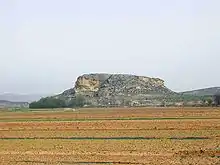Contestani
The Contestani were an ancient Iberian (Pre-Roman) people of the Iberian peninsula (the Roman Hispania). They are believed to have spoken the Iberian language.

.jpg.webp)
They lived in a region located in the southwest of Hispania Tarraconensis, east of the territory of the Bastetani, between the city of Urci, located NE of the Baetica and river Sucro, today known as Júcar. Nowadays this would correspond to a section of the Albacete Province, the eastern part of the Region of Murcia and the southern part of the Valencian Community.[1]
Cartago Nova was within its territory. Other important towns were Setabi (Xàtiva), Lucenti or Lucentum (La Albufereta in Alicante), Alonis (Villajoyosa), Ilici (Elche), Menlaria, Valentia and Iaspis. Iberian coins were minted at Setabi.[2] Important Contestani archaeological sites include Tolmo de Minateda hill near Hellín and Bastida de les Alcusses, near Mogente.[3]
See also
References
- Lorenzo Abad Casal, La Contestania Ibérica, treinta años después, Universidad de Alicante. Servicio de Publicaciones, 2005. ISBN 84-7908-845-1
- José Uroz Sáez, Economía y sociedad de Contestania ibérica, Instituto de estudios alicantinos,1998. ISBN 84-00-04959-4
- Abad Casal L, Gutiérrez Lloret S, Sanz Gamo R. El Tolmo de Minateda. Una historia de tres mil quinientos años. Junta de Comunidades de Castilla La Mancha, Toledo, 1999
External links
| Wikimedia Commons has media related to Contestani. |
- https://web.archive.org/web/20120721085139/http://www.contestania.com/
- Detailed map of the Pre-Roman Peoples of Iberia (around 200 BC)
- Alicante Archaeological Museum
- Villena Archaeological Museum